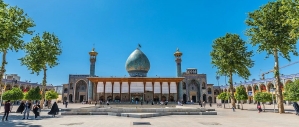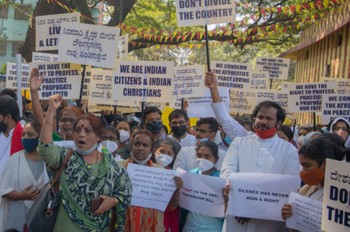
A Christian woman held without charges in Iran since Sept. 9 wept uncontrollably during the five minutes her mother was allowed to visit her on Monday (Sept. 30), a relative said.
The Islamic Revolutionary Guard Corps arrested Mojdeh Falahi, 36, a convert from Islam, when she went to the prosecutor’s office in Shiraz at the request of a Christian who had been arrested the previous day and told her he needed documents in order to be released.
During the visit on Monday, the second by her mother, Falahi wept unconsolably, and her family is worried about mistreatment by authorities and conditions of her confinement, said Sam Khosravi, Falahi’s brother-in-law.
“Psychologically, she is in a very bad condition and only cries,” Khosravi told Morning Star News.
Falahi, who works as a hairdresser, has been transferred to the Pelak-e 100 Detention Center, a prison run by Iran’s Ministry of Intelligence, according to Khosravi.
Though no charges have been filed against Falahi, her family believes intelligence agents are intensely interrogating her for information about other Christians. Relatives are particularly worried because Falahi’s detention has lasted more than 10 days, unusual in investigations of most Christian women, Khosravi said.
“Mojdeh’s mother goes to the court every day to pursue the case and asks the judge to release her,” Khosravi said on Monday (Sept. 30). “She went to the court today, and after a lot of begging, the judge allowed her to see Mojdeh.”
Relatives are also confused about her detention because she is not a leader in any church and would be less likely to have information about other Christians, Khosravi said. She has not been given access to a lawyer.
Before Monday, the family went to the prosecutor’s office several times to request a visit but were able to talk with Falahi only briefly by phone and see her in person once for three minutes. Iranian officials offered family members, including Falahi’s mother, more visitation time if they would encourage her to give them more information, Khosravi said, but the family refused.
Relatives have been unable to determine the exact conditions of Falahi’s detention because she is unable to speak openly during their visits, Khosravi said.
“We do not know what exactly has happened to her because she was being monitored,” he said. “We worry and wonder why they have kept her for such a long time.”
Relatives most fear that Iranian authorities are brutalizing Falahi in a way that could leave her psychologically scarred for life, Khosravi said. He is familiar with Iranian government treatment of imprisoned converts as he has been jailed for his faith along with his wife and sister-in-law, Falahi’s older siblings.
Agents from the Ministry of Intelligence in July 2019 arrested Khosravi in Bushehr along with his wife, Maryam Falahi, his brother Sasan and wife Marjan Falahi and four others in raids on house churches and converts from Islam. The government detained eight converts in total and eventually found all but one of those arrested guilty of “propaganda against the state.”
They received various sentences, including prison time, fines, banishment from Bushehr and were disqualified from certain types of employment. Maryam Falahi, a nurse, was banned from working for any national hospital.
Most wrenching was an Iranian court’s decision in September 2020 to terminate Khosravi Falahi’s custody of their adopted daughter, Lydia, because they were Christians, he said. Lydia, being of unknown parentage, was considered Muslim by the Iranian government.
Khosravi said the main goal of detention isn’t always punishment or even to gather information, but to break a prisoner at such a fundamental level that they are shattered permanently. The intent is to force them to renounce their faith or to spread fear among other converts from Islam.
Khosravi said a fellow Christian had been so badly treated that she refused to enter church sites even years after her release. Another Christian, forced to listen to the cries of a woman screaming in a near-by cell, was convinced by guards that it was his wife being raped repeatedly, he said.
“It’s all about humiliation,” Khosravi said. “There will be things in their mind and heart they will never get over.”
Falahi’s mother has been the one most affected by the detention.
“Her situation is so bad,” Khosravi said. “She has become like a person with Alzheimer’s. She’ll do something once, forget and then do it again. She is under a lot of pressure.”
Khosravi is living in hiding to avoid Iranian authorities.
Iran ranked ninth on Christian support organization Open Doors’ 2024 World Watch List (WWL) of the 50 countries where it is most difficult to be a Christian. The report noted the “growing involvement of the Islamic Revolutionary Guard Corps (IRGC) in conducting raids on house churches, and a higher incidence of acts of violence committed during arrests and interrogations.”
© 2023 Morning Star News. Articles/photos may be reprinted with credit to Morning Star News. https://morningstarnews.org. Morning Star News is a 501(c)(3) non-profit corporation that relies solely on contributions to offer original news reports of persecuted Christians. By providing reliable news on the suffering church, Morning Star News’ mission is to empower those in the free world to help and to encourage persecuted Christians that they are not forgotten or alone.





